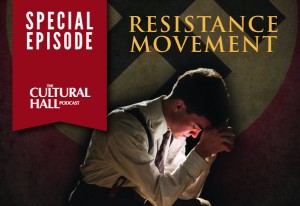This film tells the true story of the youngest known resistance group of World War II. When German teenagers Rudi Wobbe, Helmuth Hübener, and Karl-Heinz Schnibbe listen to illegal radio broadcasts from England, they learn that the Nazis have been lying. Determined to spread the truth, Helmuth develops a plan to spread anti-Nazi leaflets throughout Hamburg. Fifteen-year-old Rudi idealistically believes their small group can make a difference. When they are arrested by the Gestapo, Rudi and his friends are unprepared for the brutality of the Nazi regime. Accused of treason, the trio must face the infamous Blood Tribunal with their lives in the hands of Nazi party loyalists. You will be inspired by the faith, courage, and strength of these three young men as they fight for truth in a time of darkness.
Podcast: Play in new window | Download
Subscribe: RSS


I was a little disappointed in one small thing in this episode. The playwright/screenwriter said something to the effect that when she heard about the story of the 3 LDS youths she thought that the story would make a great play.
Perhaps I’m reading this wrong, but that kind of implies that there wasn’t already a play about their story. In fact, there is. BYU Professor Tom Rogers (a fine playwright) produced the play “Huebner” in 1976 at BYU.
This left me wondering: Did the playwright you interviewed simply not research to find out what had already been done? Or did she want to avoid bringing up the previous play so she didn’t have to justify why she did a new play?
It does sound like the purposes of the two are VERY different. Rogers’ play is VERY Mormon, and is considered a fairly important LDS play. I think it needs to be produced more, because it asks important questions about how we should act as Mormons.
So, I was disappointed that Rogers’ play wasn’t mentioned. Still, I’m glad that this film has been successful. The story is important.
Kent, I’m sorry if my comments were confusing. I merely meant that as I heard the story of the Huebener group for the very first time, my immediate, gut response in the moment was that it would make a great play.
Not being from Utah, I was actually not yet familiar with the play “Huebener”. After my initial reaction I, of course, came home and did all the research I could on the story. In that research I did come across Tom Rogers’ play, as well as all the books, and the documentary. But that’s the great thing about the arts, isn’t it? There isn’t just one way to tell a story. There didn’t exist a version that told the story in the way I felt it most deeply and that focused on the aspects I wanted to focus on, so I added my own voice to the mix.
As for why I didn’t talk about “Huebener” in this interview: The simple answer is that I wasn’t asked about it. I have been asked about it in other interviews and have never shied away from responding. Like you said, both scripts have very different purposes, and there is nothing wrong with that. They don’t need to compete and, if anything, the existence of another version of the story can only serve to bring more attention to this important story in all its incarnations. In this instance it was simply that I was invited to the interview to focus on the version I wrote, so that is what I did.
Kathryn, I’m sorry if I gave the impression that I think you have done something wrong in not mentioning Rogers’ play. I don’t think you had any obligation to mention it. I guess it just struck me, given my own knowledge, as missing somehow. But that’s just me.
I should clarify one thing that probably isn’t clear. Rogers’ “Huebener” is an important work. If there is such a thing as “great” or “important” Mormon literature, “Huebener” is one of the great or important works. [You can see this because the current Mormon Literature course at BYU has it on the reading list! — http://www.patheos.com/blogs/welcometable/2013/12/literature-of-the-latter-day-saints/ (this is the professor’s personal blog)]
Having said that, I do look forward to seeing your treatment of the story. I agree 100% that the arts are great for that reason — stories can (and perhaps should) be told and retold many times, and the story of Helmut Huebener and his friends is one of those stories that can touch many, many people.
This story is also a book called “Hübener vs. Hitler”. This story was told to me by a woman in my ward. Her father or grandfather(I don’t remember which) was Hubener’s employer. He was arrested and questioned for many days over all of this. Apparently they had used his typewriter to produce many of these documents and the SS questioned him for a week or so. She tells the story of how he was very lucky to have been released and survive the experience. She tells about how he testifys about how he was guided in what to say to the SS and thankfully lived to tell the story.